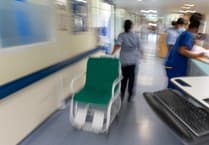This month, official statistics showed that the UK had returned to recession. It was therefore brave of Damian Hinds (Alton Herald, February 22) to use his article in this newspaper last week to defend this Conservative government’s record on the economy.
I can understand why Mr Hinds, as a Conservative MP and Government minister, wants to convince readers that he sees evidence of progress. But the facts tell a different story. The truth is that growth has evaporated.
UK productivity is among the weakest in the G7. National debt as a share of GDP has risen to levels last seen in the 1950s. Overall taxation has risen to levels not seen since the 1940s. In 2023/24 the UK is forecast to spend £94 billion on debt interest repayments: nearly three times as much we will spend on our national defence.
There is no doubt the last few years have been tough. The economic disruption and consequences of the coronavirus pandemic have been a challenge for policy-makers everywhere. In the UK, the upheaval caused by Brexit has made things worse.
But managing the economy in both good and bad times is the job and responsibility national leaders accept when they take the reins of government. The country has a right to expect that our elected representatives will exercise that responsibility with competence and care.
Voters I meet on the doorstep are still furious about the calamitous fiscal irresponsibility of the Liz Truss Government of a little over a year ago. They won’t forget that it was a Conservative government that caused turmoil in the financial markets and sent interest rates soaring, hitting our national purse and people’s pockets.
With so much damage to repair, whoever wins the next General Election will face tough choices. There is a clear need to reduce the tax burden on ordinary people faced with the worst cost of living crisis in more than a generation.
But there is also an urgent requirement to re-invest in public services like the NHS and our rail system that has suffered from years of neglect.
And to encourage investment in the new industries and jobs that will power the UK towards the goal of Net Zero carbon emissions.
The upcoming General Election will be decided on how voters judge the different parties’ choices.
All the indications are that the Conservative Government intends to prioritise tax cuts, including for the richest – contrary to advice from the IMF and in the face of polling that suggests that most voters would rather see money spent on improving neglected public services. It was disappointing that Mr Hinds failed to mention public services in his article.
By contrast, the Liberal Democrats are championing policies that prioritise investment in infrastructure, innovation and skills; that help develop a fairer tax system, including clamping down on tax avoidance and evasion, and ensuring that the tax burden does not fall disproportionately on low earners; and that start to fix our badly damaged public services – above all, the NHS.
But this all has to be achieved within a framework that delivers responsible management of the public finances. The Liberal Democrats believe that day-to-day spending should not exceed money raised in taxes over the medium term, with additional flexibility during periods of economic crisis.
As the economy turns to growth, this will unlock much-needed public and private investment – and deliver greater economic stability than seen under this succession of short-lived Conservative prime ministers.
By Dominic Martin
Lib Dem parliamentary candidate for East Hampshire
Dominic Martin is a former UK Ambassador to the Organisation of Economic Cooperation and Development and is now Liberal Democrat Prospective Parliamentary Candidate for East Hampshire



-Amber-warning-for-cold-weather.png?width=209&height=140&crop=209:145,smart&quality=75)
Comments
This article has no comments yet. Be the first to leave a comment.